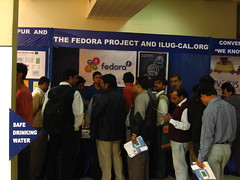I spent a day and a half at the Freedom in Computer Technology 2008 convention on 26th and 27th of this month. Susmit has already blogged about it. Some pictures are:
more pictures are available at the usual location. I missed out taking a group picture of the volunteers and the stall before we went into business. My bad. Noted that down as a mandatory picture for next time.
For various reasons it had been a while I have been at a stall, so the “buzz” at seeing folks lining up to hear about F10, L10n and getting their media was exciting enough. Somewhat strangely, not many questions were around the proprietary codec stuff (read: “I want to play mp3”). Having the GLUG-NIT,Durgapur (and, I met Debayan as well) at the next stall meant that we had converging streams of interested audience. It is always a good feeling to finally meeting up with a lot of names from IRC and mailing list. The F10 artwork got rave reviews 🙂
A big round of “Thank You” to all the volunteers (Gopal+his student, Dipanjan, Sarbartha, Ravi, Susmit and Indranil) who made time over the weekend to turn up, tirelessly stand around and answer questions with a big smile. A sizeable quantity of the media and leaflet/handouts were given away. Names of those interested to be on the list have been taken down and Susmit plans to get back in touch with them. Another good thing that came out was the ad-hoc sit down with the colleges who desire to have some “Activity Day”.
I had a small talk on the “Community Model” and how FOSS businesses should begin by looking at getting their act together on it. Had a couple of questions. However, given the audience profile, most questions were around FOSS software and licensing vis-a-vis “freeware”.
Would have been really nice to have network so as to show-off a few stuff – well next time perhaps. The LiveUSB station also got some love 🙂 so I guess that made up for the trouble taken to set it up. The next time IOTA organizes a convention like this it would be good to have a segment for Workshops as well as an Expo area for stalls to be set up. Casting the net a bit more wider in the industry does help in getting stuff being talked about.
ps: I don’t know if the Stallman speech would be having a transcript available, but it would be good to have
pps: Was nice to know that Gopal’s student has been using Fedora since F7 and is proficient with a Linux desktop. It was obvious in the way he helped manage the stall at times.






